

Insider GCSE creative writing tips + 106 prompts from past papers
by Hayley | Mar 9, 2023 | Exams , Writing | 0 comments
Are you feeling a little bit twitchy about your child’s English GCSE writing task?
Sciences and humanities – although sometimes daunting in their content – seem a fair bet as ‘revisable’ topics. But the creative writing element of the English Language GCSE is less knowable and ultimately more of a frightening prospect for a student keen to do well.
Preparing for the GCSE writing task? You don’t need to do it alone.
We run a weekly online writing club which prepares students to write high-scoring content. Our “Higher” level club is designed to transform your writing so that you can ace the GCSE language paper.
What is the GCSE writing element of the GCSE Language Paper?
There are 5 key GCSE exam boards: AQA , OCR , Pearson Edexcel , WJEC Eduqas and CCEA . Each board sets their own papers which may appear much the same at first glance (bizarrely they all have a similar front cover layout and fonts). Certainly there is plenty of overlap between their mark schemes and the comments and tips they share in their Examiner Reports.
However, as with all your child’s other subjects, it is essential to know which exam board they are preparing for. You may be surprised to discover that schools pick and choose boards by subject, perhaps choosing AQA for chemistry and OCR for mathematics. Individual school departments have their own preferences. My brother teaches at a school where their English Literature and English Language exams have been split between two different boards. This is unusual though, not the norm!
What forms (question formats) can the test take?
It varies by board.
The AQA board has a writing task in their Question Paper 1 called Explorations in creative reading and writing . Students are given two prompts to choose between. The AQA board also has a second persuasive writing task in Paper 2 called Writers’ viewpoints and perspectives.
Jump ahead to AQA creative writing and persuasive writing prompts from past GCSE papers
The Pearson/Edexcel international iGCSE favoured by many UK private schools has two prompts to choose between for each section. The student is asked to complete a piece of transactional writing (perhaps a persuasive speech or an advertisement leaflet) and additionally a piece of imaginative writing.
Jump ahead to Pearson/Edexcel transactional writing and imaginative writing prompts from past GCSE papers
Interestingly, the WJEC Eduqas board favours non-fiction writing. Unit 2 Reading and Writing: Description, Narration and Exposition gives two prompts to choose between, for an account and an essay perhaps, and Unit 3: Reading and Writing: Argumentation, Persuasion and Instructional sets up a letter, or similar.
Jump ahead to WJEC Eduqas non-fiction writing prompts from past GCSE papers
The OCR board offers two prompts to choose between. One might be a talk for other students and the other might be a letter on a difficult subject .
Jump ahead to OCR creative writing prompts from past GCSE papers
The CCEA board has a writing task in called “ Writing for Purpose and Audience and Reading to Access Non-fiction and Media Texts” and a second writing task which offers a choice between personal writing and creative writing.
Jump ahead to CCEA persuasive writing, personal writing, and creative prompts from past GCSE papers
How long do students have to craft their piece of writing?
Creative writing tests are timed at either 45 minutes or 1 hour. The last thing your child will need is to prepare to write for an hour, only to find they have just three-quarters of an hour on the day. If in doubt, insist that they check with their teacher.
AQA students are given 45 minutes to produce their writing response. The introduction advises: ‘ You are reminded of the need to plan your answer. You should leave enough time to check your work at the end.’ What this means is that 30–35 minutes max is what’s really allowed there for the writing itself.
Pearson/Edexcel allows 45 minutes for each of the two writing tasks.
OCR students are given an hour to complete this section of their exam. The introduction states: ‘You are advised to plan and check your work carefully,’ so they will expect the writing itself to take 45–50 minutes.
How long should the completed GCSE writing task be?
Interestingly, although the mark schemes all refer to paragraphingthey don’t state how many paragraphs they expect to see.
‘A skilfully controlled overall structure, with paragraphs and grammatical features used to support cohesion and achieve a range of effects’ (OCR)
‘Fluently linked paragraphs with seamlessly integrated discourse markers’ (AQA)
Why? Because management of paragraph and sentence length is a structural technique available to the student as part of their writers’ toolkit. If the number of optimal paragraphs were to be spelled out by the board, it would have a negative impact on the freedom of the writer to use their paragraphs for impact or to manage the pace of the reader.
For a general guide I would expect to see 3 to 5 paragraphs in a creative piece and 5 paragraphs in a persuasive piece. Leaflets have a different structure entirely and need to be set out in a particular form to achieve the top notes of the mark scheme.
What are the examiners looking for when they are marking a student’s creative writing paper?
There are two assessment objectives for the writing itself:
- It has to be adapted to the form, tone and register of writing for specific purposes and audiences.
- It has to use a range of vocabulary and sentence structures, with appropriate paragraphing, spelling, punctuation and grammar.
As a GCSE English nerd, I really enjoy delving deeper into the Examiner Reports that each board brings out once the previous cohort’s papers have been marked. They are a fascinating read and never disappoint…
Within their pages, examiners spell out the differences they have spotted between the stronger and the weaker responses.
For example, a creative task set by the AQA board was to describe a photograph of a town at sunset. The examiners explained that some of the strongest responses imagined changes in the scene as darkness descended. They enjoyed reading responses that included personification of the city, and those that imagined the setting in the past, or the weariness of the city. Weaker candidates simply listed what was in the picture or referred directly to the fact it was an image. This chronological-list approach weakened the structure of their work.
No surprises that some weaker students relied heavily on conversation. (As an exam marker myself, I dreaded reading acres of uninspiring direct speech.)
Pearson/Edexcel explain that weaker persuasive pieces (in this case on the value of television) simply listed pros and cons rather than developed ideas fully to clarify their own opinions. The higher-level responses here were quirky and engaging, entertaining the reader with a range of appropriate techniques and making the argument their own.
What accommodations are possible for students who have specific learning difficulties?
The UK Government’s Guide for Schools and Colleges 2022: GCSE, AS and A Levels includes information about changes to assessments to support ‘disabled students.’ Their definition of disabled includes specific learning difficulties (dyslexia, dyspraxia, ADHD, ADD, ASD etc).
Exam boards can make a wide range of adjustments to their assessments. Some of the most common adjustments are:
- modified papers (for example, large print or braille exam papers)
- access to assistive software (for example, voice recognition systems or computer readers)
- help with specific tasks (for example, another person might read questions to the student or write their dictated answers)
- changes to how the assessment is done (for example, an oral rather than a written assessment, word-processing rather than hand-writing answers)
- extra time to complete assessments
- exemptions from an assessment
The exam board will expect paperwork to be in place where your child’s specific needs are formally reported by an appropriate professional (Educational Psychologist, Clinical Psychologist, Consultant). The report needs to be recent, but how recent is difficult to confirm.
If your child is likely to need adjustments to their access arrangements you will need to discuss this with their school in plenty of time before the exam itself.
A close friend of mine realised in the final few weeks before her son’s GCSE exams that his tinnitus would have a negative impact on his performance. She approached the school to ask if he might take his exams in a separate room to minimise noise disturbance. Unfortunately, it was far too late by then to apply, and her son was denied the request.
Your child’s school will explain the process for applying for special arrangements and will be able to advise you on what your expectations should be. Never presume your child will be given what they need – but plenty of requests are successful, so stay positive and make sure your paperwork is in order beforehand.
Tips and strategies for writing a high scoring GCSE creative writing paper:
1. learn the formats.
Know the different formats and conventions of the different GCSE writing tasks. There is a standard layout for a leaflet, for example, where including contact details and a series of bullet points is part of the mark scheme. Not knowing these conventions will knock back a student’s score.
2. Plan ahead
Prepare a planning structure for each of the written forms you might encounter during the exam. It may need to be flexed on the day, but it will banish fear of the blank page and allow you to get started.
3. Prepare sentence-openings
Familiarise yourself with appropriate sentence-openings for each type of GCSE writing task. Fronted adverbials of time and place will improve the quality of a creative piece, whereas access to varied and specific conjunctions might push up the mark of a transactional piece.
4. Check your speaking
Ask your family to check your speech at home. Every now and then try to flip a sentence into formal language, using more interesting synonyms for your usual spoken vocabulary. This will help you to write formally on paper, avoiding colloquialisms.
5. Forget finishing
Finishing is less important than you might imagine. Sloppy, hurried work is your enemy. GCSE examiners will follow your clear planning and mark you accordingly, even if you’ve not managed to complete that final paragraph.
6. Note the details
The question often gives additional information the examiner would like to see included. Note it in your plan to make sure it doesn’t get forgotten.
7. Start strong
Use your best sentence-opener at the start of each paragraph. It will set you up as someone to be taken seriously.
8. Cut back dialogue
Keep dialogue contained in a single paragraph. Focus on description of the speaker and their actions before noting the second character’s reply.
9. Revise
Do this by prepping work as above. Nothing beats it.
Would you like me to transform your child’s writing in my higher writing club?
Each week in my higher writing club , we spend 20 minutes on Zoom together. After the task has been introduced, the students write for 15 minutes. Next, they upload their work for 1:1 video marking.
There is no point prepping essays/creative pieces for the GCSE English Language exam if your child’s writing is poor. First, their scruffy presentation, attention to detail, punctuation, grammar and vocabulary need to be addressed.
After 2 months in the higher writing club your child’s written technique and fluency will be transformed by our 1–2-1 video marking system (consistent messaging is achieved by matching your child with their own teacher).
Each weekly activity is drawn directly from the GCSE English Language Subject Content and Assessment Objectives , published by the English Department of Education.
Here’s an example of a student’s writing, BEFORE they joined our club:

It is chaotic, poorly-presented and nonsensical. Letter-sizing is confused and the student is clearly anxious and repeatedly scribbling through small errors.
Below is the same student 2 months later:

Observe the rich vocabulary, authorial techniques (the jagged rocks are ‘like shards of broken glass’) and general fluency and sophistication.
Real and recent GCSE example questions/prompts from each of the 5 key exam boards
Aqa english language gcse questions, paper 2 writers’ viewpoints and perspectives:.
- ‘Our addiction to cheap clothes and fast fashion means young people in poorer countries have to work in terrible conditions to make them. We must change our attitude to buying clothes now.’ Write an article for a magazine or website in which you argue your point of view on this statement. ( Source )
- ‘People have become obsessed with travelling ever further and faster. However, travel is expensive, dangerous, damaging and a foolish waste of time!’ Write an article for a news website in which you argue your point of view on this statement. ( Source )
- ‘Cars are noisy, dirty, smelly and downright dangerous. They should be banned from all town and city centres, allowing people to walk and cycle in peace.’ Write a letter to the Minister for Transport arguing your point of view on this statement. ( Source )
- ‘All sport should be fun, fair and open to everyone. These days, sport seems to be more about money, corruption and winning at any cost.’ Write an article for a newspaper in which you explain your point of view on this statement. ( Source )
Paper 1 Explorations in creative reading and writing:
- A magazine has asked for contributions for their creative writing section. Either write a description of an old person as suggested by the picture below or write a story about a time when things turned out unexpectedly. ( Source )

- Your school or college is asking students to contribute some creative writing for its website. Either, describe a market place as suggested by the picture below or write a story with the title, ‘Abandoned’. ( Source )

- Your local library is running a creative writing competition. The best entries will be published in a booklet of creative writing. Either, write a description of a mysterious place, as suggested by the picture below or write a story about an event that cannot be explained. ( Source )

- A magazine has asked for contributions for their creative writing section. Either, describe a place at sunset as suggested by the picture below or write a story about a new beginning. ( Source )
OCR English Language GCSE questions
Paper: communicating information and ideas.
- Either, Write a post for an online forum for young people about ‘A moment that changed my life’.
- Or, You are giving a talk at a parents’ information evening about why all children should study science at school. Explain your views. ( Source )
- Either, Write a letter to a friend to describe a challenging and unpleasant task you once had to do.
- Or, Write a short guide for new workers about how to deal successfully with difficult customers. ( Source )
- Either, “Was it worth it?” Write an article for a magazine to describe a time when you had to do something difficult.
- Or, Write a speech for an event to congratulate young people who have achieved something remarkable. ( Source )
- Either, Write the words of a talk to advise pet owners how to make life more enjoyable for their pet and themselves.
- Or, Write an article for a travel magazine to describe your dramatic encounter with an animal. ( Source )
- Either, ‘How I prefer to spend my time.’ Write the words of a talk to young people about your favourite activity
- Or, Write a magazine article to persuade parents to allow their teenage children more freedom. You are not required to include any visual or presentational features. ( Source )
- Either, Write a talk for other students about a person you either admire strongly or dislike intensely
- Or, Write a letter to a friend to explain a difficult decision you had to make. ( Source )
Paper: Exploring effects and impact
- Either, Hunger satisfied. Use this as the title for a story.
- Or, Write about a time when you were waiting for something. ( Source )
- Either, The Taste of Fear Use this as the title for a story.
- Or, Write about a time when you were exploring a particular place. ( Source )
- Either, Alone. Use this as the title for a story.
- Or, Describe a time when you found yourself in a crowd or surrounded by people. ( Source )
- Either, Land at Last. Use this as the title for a story.
- Or, Imagine you have visited somewhere for the first time and are now reporting back on your experience. ( Source )
- Either, The Playground Use this as the title for a story
- Or, Write about a memory you have of playing a childhood game. ( Source )
- Either, It seemed to me like I had been magically transported. Use this as the title for a story.
- Or, Describe a place where you have felt comfortable. ( Source )
Pearson Edexcel English Language iGCSE questions
Paper 1: transactional writing.
- Either, ‘In our busy twenty-first century lives, hobbies and interests are more important than ever.’ Write an article for a newspaper expressing your views on this statement.
- Or, ‘We are harming the planet we live on and need to do more to improve the situation.’ You have been asked to deliver a speech to your peers in which you explain your views on this statement. ( Source )
- ‘ Zoos protect endangered species from around the world.’ ‘No wild animal should lose its freedom and be kept in captivity. Write an article for a magazine in which you express your views on zoos.
- Write a review of an exciting or interesting event that you have seen. ( Source )
- Your local newspaper has published an article with the headline ‘Young people today lack any desire for adventure’. Write a letter to the editor of the newspaper expressing your views on this topic.
- ‘The key to success in anything is being prepared.’ Write a section for a guide giving advice on the importance of preparation. ( Source )
- You and your family have just returned from a holiday that did not turn out as you expected. Write a letter to the travel agent with whom you booked your holiday, explaining what happened.
- A magazine is publishing articles with the title ‘Friendship is one of the greatest gifts in life’. Write your article on this topic. ( Source )
- ‘Important lessons I have learned in my life.’ You have been asked to deliver a speech to your peers on this topic.
- Your local/school library wants to encourage young people to read more. Write the text of a leaflet explaining the benefits of reading. ( Source )
- ‘Most memorable journeys.’ A website is running a competition to reward the best articles on this subject. Write an article for the competition about a memorable journey.
- ‘Cycling is one form of exercise that can lead to a healthier lifestyle.’ Write a guide for young people on the benefits of exercise. ( Source )
- ‘Television educates, entertains and helps global understanding.’ ‘Television is to blame for society’s violence and greed and delivers one-sided news.’ You have been asked to deliver a speech in which you express your views and opinions on television.
- ‘Choosing a career is one of the most important decisions we ever make.’ Write the text of a leaflet that gives advice to young people on how to choose a career. ( Source )
- Write the text for a leaflet aimed at school students which offers advice on how to deal with bullying.
- A museum is planning to open a new exhibition called ‘Life in the Twenty-First Century’. ( Source )
Paper 2: Imaginative writing
- Write about a time when you, or someone you know, enjoyed success
- Write a story with the title ‘A Surprise Visitor’.
- Look at the two images below. Choose one and write a story that begins ‘I did not have time for this’ ( Source )

- Write about a time when you, or someone you know, challenged an unfair situation.
- Write a story with the title ‘Bitter, Twisted Lies’.
- Look at the two images below. Choose one and write a story that begins ‘It was a new day …’ You may wish to base your response on one of these images. ( Source )

- Write about a time when you, or someone you know, visited a new place.
- Write a story with the title ‘The Storm’
- Look at the two images below. Choose one and write a story that ends ‘I decided to get on with it.’ ( Source )

- Write about a time when you, or someone you know, saw something surprising.
- Write a story with the title ‘The Meeting’.
- Look at the two images below. Choose one and write a story that starts ‘Suddenly, without warning, there was a power cut.’ ( Source )

- Write about a time when you, or someone you know, went on a long journey.
- Write a story with the title ‘A New Start’
- Look at the two images below. Choose one and write a story that begins ‘I tried to see what he was reading. ( Source )

- Write about a time when you, or someone you know, felt proud.
- Write a story with the title ‘The Hidden Book’.
- Look at the two images below. Choose one and write a story that begins ‘It was like a dream’ ( Source )

- Write about a time when you, or someone you know, had to be brave
- Write a story with the title ‘Everything Had Changed’
- Look at the two images below. Choose one and write a story that begins ‘It was an unusual gift’. ( Source )

WJEC Eduqas English Language GCSE questions
Unit 2 reading and writing: description, narration and exposition.
- Write an account of a time when you enjoyed or hated taking part in an outdoor activity.
- “It’s essential that more people are more active, more often.” (Professor Laura McAllister, Chair of Sport Wales) Write an essay to explain how far you agree with this view, giving clear reasons and examples. ( Source )
- Describe an occasion when you did something you found rewarding.
- Famous chefs such as Jamie Oliver and Mary Berry have spoken of the need for better food and better education about food in schools. Write an essay to explain your views on this subject, giving clear reasons and examples. ( Source )
- Write an account of a visit to a dentist or a doctor’s surgery.
- NHS staff, such as doctors and nurses, provide excellent service in difficult circumstances. Write an essay to explain your views on this subject, giving clear reasons and examples. ( Source )
- Write an article for a travel magazine describing somewhere interesting that you have visited.
- You see the following in your local newspaper: ‘Young people are selfish. They should all be made to volunteer to help others.’ Write an essay to explain your views on this subject, giving clear reasons and examples. ( Source )
- Describe an occasion when technology made a difference to your life.
- Write an account of a time you were unwilling to do something. ( Source )
- Describe a time when you faced a challenge
- Write an essay explaining why charity is important, giving clear reasons and examples. ( Source )
- Write an account of a time when you did something for the first time.
- “It’s time for us to start making some changes. Let’s change the way we eat, let’s change the way we live, and let’s change the way we treat each other.” Tupac Shakur Write an essay on the subject of change, giving clear reasons and examples. ( Source )
- “School uniform is vitally important in all schools.” Write an essay explaining your views on this, giving clear reasons and examples.
- Describe a time when you had to create a good impression. ( Source )
Unit 3: Reading and writing: Argumentation, persuasion and instructional
- Your school/college is considering using more Fairtrade items in its canteen. Although this will help to support Fairtrade farmers, it will mean an increase in the price of meals. You feel strongly about this proposal and decide to write a letter to your Headteacher/Principal giving your views. ( Source )
- Increasing litter levels suggest we have lost all pride in our beautiful country. Prepare a talk for your classmates in which you give your opinions on this view. ( Source )
- Write a guide for other students persuading them to stay safe when using social media and the internet. ( Source )
- According to your PE teacher, ‘Swimming is the very best form of exercise.’ You have been asked to prepare a talk for your classmates in which you give your views about swimming. ( Source )
- You read the following in a newspaper: ‘Plastic is one of the biggest problems faced by our planet. Why would we use something for a few minutes that has been made from a material that’s going to last forever?’ Write a letter to the newspaper giving your views on the use of plastic. ( Source )
- “People today never show enough kindness to one another. We must make more effort to be kind.” Write a talk to give on BBC Wales’ new programme Youth Views persuading young people to be kind to others. ( Source )
- ‘We have enough problems in the world without worrying about animals.’ Write an article for the school or college magazine giving your views on this statement.
- You would like to raise some money for an animal charity. Write a talk for your classmates persuading them to donate to your chosen charity. ( Source )
CCEA English Language GCSE questions
Unit 1: writing for purpose and audience and reading to access non-fiction and media texts.
- Write a speech for your classmates persuading them to agree with your views on the following issue: “Young people today are too worried about their body image.” ( Source )
- Write an article for your school magazine persuading the readers to agree with your views on the following question: “Should school uniform have a place in 21st century schools?” ( Source )
- Write a speech for your classmates persuading them to agree with your views on the following question: “Are celebrities the best role models for teenagers?” ( Source )
- Write an article for your school magazine persuading the readers to agree with your views on the following statement: “Advertising is just another source of pressure that teenagers don’t need!” ( Source )
Unit 4: Personal or creative writing and reading literacy and non-fiction texts
- Either, Personal writing: Write a personal essay for the examiner about what you consider to be one of the proudest moments in your life.
- Or, Creative writing: Write your entry for a creative essay writing competition. The audience is teenagers. You may provide your own title. ( Source )
- Write a personal essay for the examiner about an experience that resulted in a positive change in your life.
- Write a creative essay for the examiner. The picture below is to be the basis for your writing. You may provide your own title. ( Source )

- Personal writing: Write a speech for your classmates about the most interesting person you have ever met.
- Creative writing: Write a creative essay for your school magazine. The picture below is to be the basis for your writing. You may provide your own title. ( Source )

- Personal writing: Write a personal essay for the examiner describing your dream destination.
- Creative writing: Write a creative essay for publication in your school magazine. The picture below is to be the basis for your creative writing. You may provide your own title. (Source)

Get 1:1 support and personalized feedback on your GCSE creative writing practice
For 1–2-1 writing support for your pre-GCSE child, join the Griffin Teaching Higher Writing Club—online weekly writing classes specifically tailored to English GCSE creative writing preparation.
In just 20 minutes per week and their writing will be transformed.
25 Awesome Story Ideas for Creative Writing for GCSE English Language
by melaniewp | Jun 23, 2013 | Creative Writing , English Language Exam , GCSE , IGCSE , Writing | 0 comments
ALL ABOUT CHARACTER

[1] Old man loses his last picture of himself with his long dead wife. This could link to ‘Long Distance’ by Tony Harrison. Trying to find it, he goes through her things. This is one for flashback. He discovers secrets, or that she has left him a series of letters/notes for after her death. Start this when he realises he’s lost the picture.
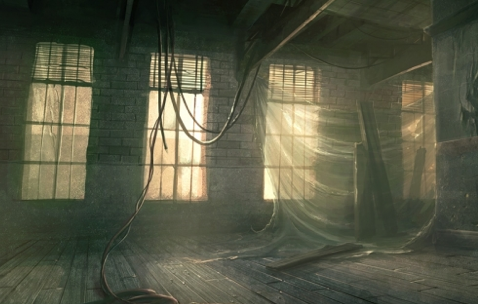
[3] A woman’s (or man’s) jealousy of her (or his) best friend takes over their life . Could link to ‘Othello’ or ‘Medusa’. Think about why. Start this when the woman is with her friend in a frenzy of jealousy…

[4] A model who has always been obsessed with her looks has acid splashed in her face and is disfigured. Could link to ‘Les Grands Seigneurs’, or ‘Mirror’ by Sylvia Plath. Start this with her looking in the mirror then opening her front door… By the way, this story is true. The woman in the picture is called Katie Piper .

[5] Fear of heights : nine year old with family who are in visiting a famous tall tower for the first time. The rest of her family want to go up the tower, but if the child won’t go up, someone will have to stay behind with them. Start this at the foot of the tower…
Want more ideas? Get a complete set plus a teaching scheme with model essays and all resources on my TES Resources shop here .

[6] Small child really wants cake but has been forbidden from taking it down from the shelf. Start this story with the child lusting after the cake, which you should describe – baking, decorating etc – in delicious detail. [ read a short, very funny version of this here ]

[7] A man is obsessed with a woman who does not love him back (or the other way round) . Could link to ‘Havisham’ by Carol Ann Duffy, ‘Give’ or ‘Alaska’ by Simon Armitage or ‘The River God’ by Stevie Smith . Start this when he realises she doesn’t love him back or when he decides to do something about it – get a haircut, stop eating raw onions, go to the gym, pretend that he also loves ‘horoscopes’ and ‘shopping’…

[8] Dangerous Ambition (links to Macbeth). Want the lead role in the school play (or to be head girl/boy)? What will you do to get it? Start this when you realise the lead is up for grabs but you’re not the first choice.

Racing Car driver (motorcross, road or drag racer) is up against his old teammate, now his main rival. Driver needs to win this one or it’s the end of his career. He sees that one of the mechanics on his rival’s car has fixed something up wrong. What does he do?

[9] Jealous woman (or man) chases husband (wife) to find out where they’re going. Could link to ‘Medusa’, ‘Havisham’, or ‘Othello’. Start this story when they decide to chase / follow. Use flashback, or recollection to explain why.

[10] Small child really wants to go to another child’s birthday party but there’s a problem. He has to go to his dad’s that weekend/hasn’t been invited/has to go to the dentist instead. How does he deal with or solve it? Start this story at the moment where the child realises he can’t go. [ read a short, hilarious one here ] III Lost

[11] An old man, who has never cooked or cleaned for himself, has just got home after his wife died (of old age, in hospital). You could link this to ‘Old Age Gets Up’ by Ted Hughes. Now he has to try to do housework – cook, etc. Could be comic / tragic.
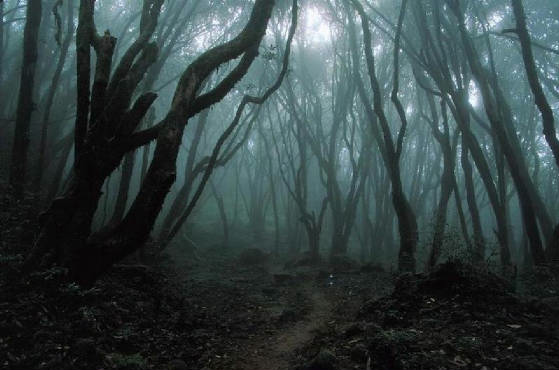
[12] You go for a forest walk (e.g. on a Geography trip or DofE) with someone you don’t like much from school and get lost. Could link to Robert Frost’s poem ‘The Road Not Taken’, ‘Storm in the Black Forest’ by D.H. Lawrence or ‘Wind’ by Ted Hughes. Start this story just before the main character begins to suspect they are lost. Start funny, ends up scary as it starts to go dark. Get describing words for a forest story here .

[13] Parent-Child: In a busy town centre, a mother loses her child who has previously been annoying her . Link this to ‘Mother A Distance Greater…’ by Simon Armitage, ‘Catrin’ by Gillian Clarke or ‘My Father Thought it Bloody Queer’. Start this with the child’s tantrum, mother’s thoughts then quickly move to realising the child is gone.

[14] World famous BMXer (or other sports person, footballer, skateboarder, surfer) is in a car crash – or other accident – and loses his leg. Will he ever ride again? This can link to ‘Out, Out-‘ by Robert Frost. For more on the guy in the photo see this video . Start this story when he wakes up in a hospital bed.

[15] A bsent father returns trying to spend time with his kids. How do they react to seeing him after so long? [this idea is done beautifully in the story, ‘Compass and Torch’ in the AQA anthology Sunlight on the Grass]. You could also link this to ‘Follower’ by Seamus Heaney. Start this when the re’s a knock at the front door.
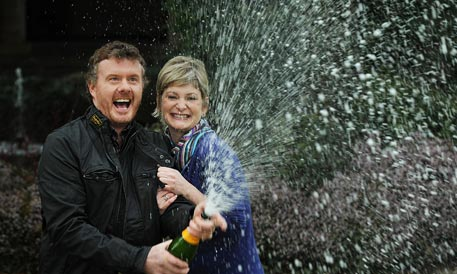
[16] You win a million pounds on the lottery. Everyone you know wants some. What would you buy? Friendships are ruined. Then you are robbed… Start this when you check your bank balance and there are sooooo many noughts at the end it looks like a bank malfunction. IV Coming of Age
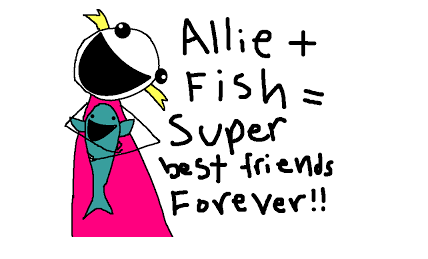
[17] Death of a pet. Ferociously funny, very short story about a girl and a fish [ here ]. Start this when you find the pet… dead, or just before. You can use flashback – when you first got the pet, etc.

[18] Learning a secret you wish you’d never found out – e.g. finding texts on your dad’s mobile from his girlfriend while your parents are still married – or learning that your mum is planning to secretly leave your dad. Start this when you’re just idly messing with the parent’s phone or laptop.
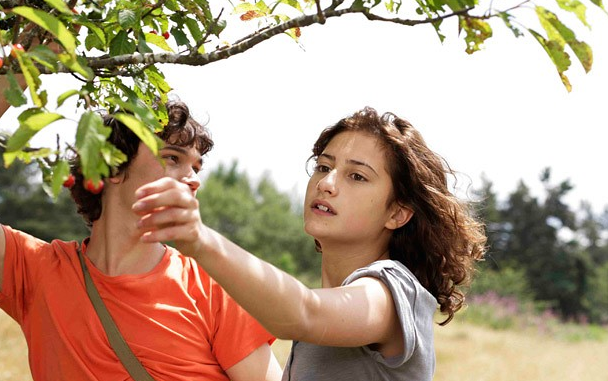
[19] falling in love for the first time , as in Romeo and Juliet. Start this when they see each other or their first proper meeting. Link this to ‘Sonnet 18 Shall I Compare Thee’, ‘Sonnet 116 Let Me Not’, ‘Quickdraw’ or ‘Hour’, by Carol Ann Duffy or ‘To His Coy Mistress’ by Andrew Marvell.

[20] The first time you have to do a really disgusting piece of housework / cook a meal for yourself and how you tackle it. Start this when you realise that no one else is going to do this foul job except you. Read a description of cooking a meal here .
V The Chase / Monsters

[21] You’re camping with your friend in the woods. Then you hear a noise outside (wolves, person, etc). Start this as you’re getting settled to go to sleep – then you hear snuffling (or whatever). Read Bill Bryson’s hilarious account of this exact event, and also an account of surviving a bear attack from the OCR exam paper here.

[22] You have something someone else wants – gold, diamonds etc. They chase you to get it. You choose the landscape: city, ruined derelict warehouses, Brazil, forest, cliffs etc. Start this at the moment you realise someone is following you. You can link this to the final chapter of Lord of the Flies .

[23] You are the last surviving human after the zombie/vampire apocalypse. Now they have found you. This is the plot of ‘I Am Legend’. You can link this to Edwin Muir’s post-apocalyptic poem ‘Horses’, ‘Wind’ by Ted Hughes or the final chapter of Lord of the Flies . Start this at the moment you (or the main character) realises someone is coming towards your hiding place.
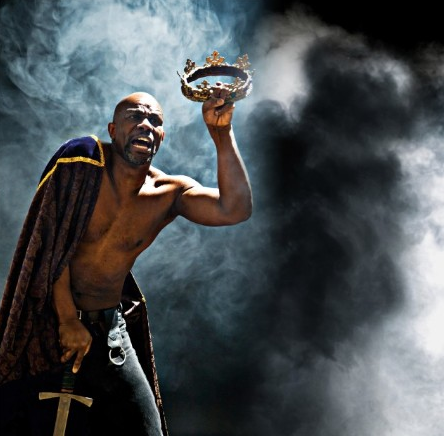
[24] The King is a tyrant who has killed your family. Now you will take revenge . Start this story as you are just about to go through the city walls.
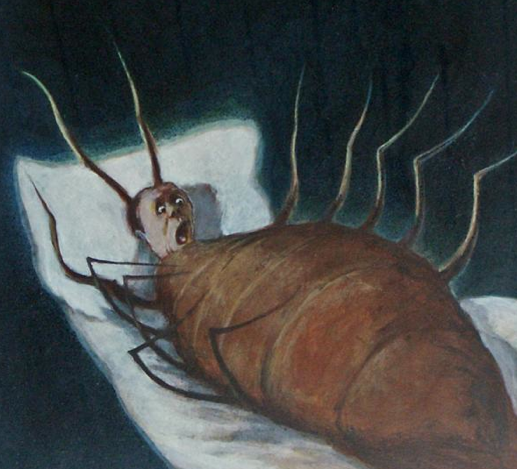
[25] You wake up and discover you have been turned into a giant insect. How does your family react? This is the plot of Kafka’s Metamorphosis. Read this here . Start at the point you wake up, and gradually realise what has happened.

Submit a Comment Cancel reply
Your email address will not be published. Required fields are marked *
Save my name, email, and website in this browser for the next time I comment.
Recent Posts
- Example English Literature Essays For Oxbridge Applications and Coursework
- What is Pathetic Fallacy? Simple Explanation for GCSE, IGCSE, and Common Entrance
- Writing to Describe Photographs of Interesting Places
- Storm on the Island Heaney: Context, Interpretation and Annotation Analysis
- The Prelude, Wordsworth: Context, Analysis, Annotation and Likely Exam Questions GCSE Poetry Exam
Recent Comments

- Creative Writing /
Writing prompts for English Language GCSE
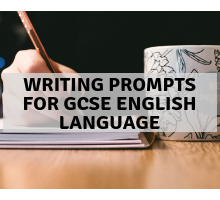
Below I have shared 5 different types of writing prompts for you to use this week with your classes! If you are preparing your classes for GCSE English Language, or any type of creative writing, then these writing will be great for you to use!
Writing a room
Choose one room in your house and list everything that can be: seen, smelt, heard, felt (and tasted).
Write 100 words describing this room using only sensory imagery .
When you have finished writing, ask yourself this question – were you able to create a sense of the room with this tightly controlled word count? If not, consider why? Look at your nouns and adjectives, are they specific and precise? Did you waste words? Make just 5 changes and see if this improves your writing.
Slow your writing down
Both of these writing prompts are great for s-l-o-w writing . Slow writing is the opposite of a quick write. The idea is to write slowly , precisely , carefully , selecting each word intentionally . Slow writing can take 5 minutes with one sentence and 30 minutes with a paragraph. Write these moments of action (or inaction), imagine them in slow-motion . Try and recreate this in your description.
- Imagine your family is eating a meal together. Someone knocks over a drink and it spills across the table. Describe this moment.
- You are waiting . Probably bored . Perhaps a bit annoyed . Walk your reader through the tick, tick, tick of your watch as you wait. It is sunset and you are waiting for your friends, who are late. Describe the setting as the day moves towards darkness.
Writing character
- Sit somewhere public (the cafeteria at school is perfect for this).
- Describe the faces of 5 strangers, show personality through expressions and gestures .
- When you have your 5 descriptions, create some conflicts between them. One character bumps into another character. Or one character asks another for help . How would your character react based on the personality you created for them?
- Find a picture of a new-born baby . Describe in detail its face and features.
- Write a precise description of the feeling of grass beneath bare feet .
- Write a precise and detailed description of a seashell . Ensure every shape and ridge is defined.
12 writing tasks in 12 days
This one is super easy. You can just click here and download the free PDF – inside you will find 12 descriptive writing tasks for your students to complete over 12 days!
So you can download this free one-page worksheet of writing tasks here !
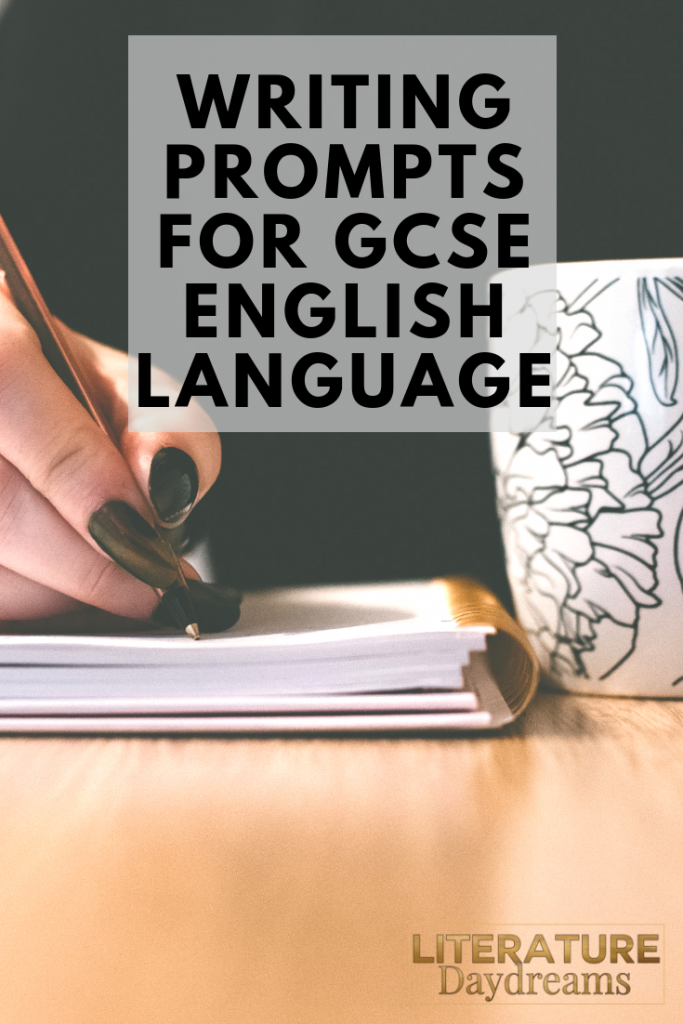
If you love these writing prompts, then sign up for my weekly “Writing on Wednesday” email. Each week I send out fresh and fun writing prompts to all my email friends! Just sign up below.

Love Creative Writing in your classroom!
Are you ready for dynamite descriptive writing in your classroom download your free 3-step guide now.
*I send emails with teaching tips, tricks, and free resources to my subscribers regularly. I value your privacy and you can learn more about how I handle your data in our private policy . You can unsubscribe at any time.
Click Here to Leave a Comment Below
Leave a Reply:
Save my name, email, and website in this browser for the next time I comment.
- Previous post
- Student Hacks
- Studying & Revision
- Work & Jobs
GCSE English language: 10+ tips for creative writing

On paper creative writing should be one of the easiest parts of the English language GCSE but you're not alone if you're finding it tricky.
Creative Writing in GCSE exams can take various forms: You may have to tell an entire short story or you could be asked to write a description of a picture.
Here's some top tips when it comes to dealing with your creative writing headaches...
Understanding the Exam Format
First and foremost, it's essential to familiarise yourself with the GCSE English Language exam format. Creative writing usually forms a significant part of the assessment, often as part of a coursework component or in a specific section of the exam. Knowing what is expected in terms of length, format, and content can significantly boost your confidence and performance.
Reading Widely
One of the best ways to enhance your creative writing skills is to read a diverse range of literature. This exposure helps you understand different writing styles, narrative techniques, and genres. By reading extensively, you can develop a sense of what makes a story engaging and learn how to incorporate these elements into your own writing.
Practising Writing Regularly
Consistent practice is key in improving your writing skills. Try to write something every day, whether it's a short story, a descriptive piece, or even just a diary entry. This not only helps improve your writing style and vocabulary but also keeps your creative juices flowing.
Answer The Question
Read it VERY carefully because your answer will only be marked in the context of what was actually asked in the first place, regardless of how well written your piece may have been. Pay special attention to the type of creative writing you're asked to come up with and it's audience (see more below).
Developing Strong Characters and Settings
In creative writing, characters and settings are the heart of your story. Spend time developing characters who are believable and relatable. Similarly, create settings that are vivid and contribute to the mood of the story. Using descriptive language and sensory details can bring your characters and settings to life.
READ MORE: > 10+ GCSE creative writing ideas, prompts and plot lines
Mastering Narrative Structure
A good story has a clear structure - a beginning, middle, and end. The beginning should hook the reader, the middle should build the story, and the end should provide a satisfying conclusion. Think about the plot and how you can weave tension, conflict, and resolution into your narrative.
Showing, Not Telling
'Show, don’t tell' is a golden rule in creative writing. Instead of simply telling the reader what is happening, show them through actions, thoughts, senses, and feelings. For example, rather than simply telling the reader a character is tall, show them that in your writing: "He towered above me like a skyscraper." This approach makes your writing more engaging and immersive.
Take Inspiration From Real Life
Write more convincingly by taking inspiration from your real life experiences and feelings, embellishing where necessary.
Go Out of This World
If you're given a prompt to write the opening of a story involving a storm, it doesn't need to be a storm on earth. Going out of this world allows you to be really descriptive in your language and paint a picture of a completely unique world or species.
Varying Sentence Structure and Vocabulary
Using a range of sentence structures and a rich vocabulary can make your writing more interesting and dynamic. Avoid repetition of words and phrases, and try to use descriptive language that paints a picture for the reader. Consider the senses such as what you might hear, smell, feel or taste.
Don't Leave The Ending To The, Well, End
Some pieces will lend themselves to a nice, easy ending - and in some questions, the ending may even be provided for you - but other times it's not so simple to stop. When it comes to fictional stories, it may well be easier to plan your ending first and work backwards, you don't want to end on a whimper, in a rush or with leftover loose ends from the plot.
Editing and Proofreading
A vital part of writing is reviewing and refining your work. Always leave time to edit and proofread your writing. Look out for common errors like spelling mistakes, grammatical errors, and punctuation issues. Also, consider whether your writing flows logically and whether there's anything you can improve in terms of language and style.
Seeking Feedback
Don’t be afraid to ask teachers, friends, or family members for feedback on your writing. Constructive criticism can provide new perspectives and ideas that can help you improve your writing significantly.
Staying Calm and Confident
Lastly, it's important to stay calm and confident during your exam. Stress and anxiety can hinder your creativity and writing ability. Practice relaxation techniques and believe in your preparation to help you stay focused and composed during the exam.
Remember, creative writing is an opportunity to express yourself and let your imagination run wild. With these tips and consistent practice, you can excel in your GCSE English Language creative writing exam look forward to results day and enjoy the process of crafting your own unique stories.
Thomas Brella is the founder of Student Hacks, starting the website in 2013 while studying at the University of Brighton to share tips and tricks on life as a cash-strapped student. He's now spent over 10 years scoping out the best ways to live on a budget
Follow on Twitter
Like on facebook.
- International
- Schools directory
- Resources Jobs Schools directory News Search
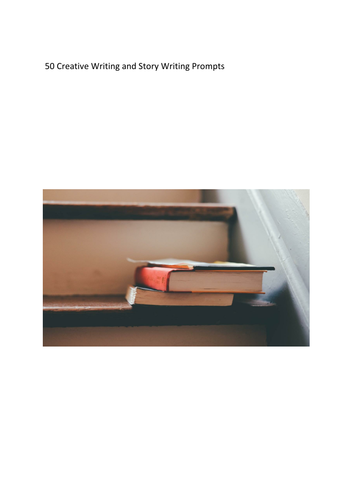
50 GCSE English Creative Writing and Story Writing Prompts
Subject: Creative writing
Age range: 14-16
Resource type: Worksheet/Activity
Last updated
22 February 2018
- Share through email
- Share through twitter
- Share through linkedin
- Share through facebook
- Share through pinterest

Tes paid licence How can I reuse this?
Get this resource as part of a bundle and save up to 42%
A bundle is a package of resources grouped together to teach a particular topic, or a series of lessons, in one place.
GCSE English Language NEW Spec
A selection of starters, activities and whole lessons.
GCSE English Language
A selection of starters, activities and while lessons.
Your rating is required to reflect your happiness.
It's good to leave some feedback.
Something went wrong, please try again later.
annika_kapur
Lots of great fiction prompts for writing and discussion with easy and accessible language
Empty reply does not make any sense for the end user
Report this resource to let us know if it violates our terms and conditions. Our customer service team will review your report and will be in touch.
Not quite what you were looking for? Search by keyword to find the right resource:

IMAGES
VIDEO
COMMENTS
Unit 2 Reading and Writing: Description, Narration and Exposition gives two prompts to choose between, for an account and an essay perhaps, and Unit 3: Reading and Writing: Argumentation, Persuasion and Instructional sets up a letter, or similar. Jump ahead to WJEC Eduqas non-fiction writing prompts from past GCSE papers.
Retold Fable. Prompt: Modernize a classic fable or story, such as the Boy Who Cried Wolf, in a contemporary setting. Potential Story Directions: The story could be set in a modern city, exploring current social issues. It might be told from a different perspective, offering a fresh take on the moral of the story.
II. Desire. [6] Small child really wants cake but has been forbidden from taking it down from the shelf. Start this story with the child lusting after the cake, which you should describe – baking, decorating etc – in delicious detail. [ read a short, very funny version of this here]
Slow your writing down. Both of these writing prompts are great for s-l-o-w writing. Slow writing is the opposite of a quick write. The idea is to write slowly, precisely, carefully, selecting each word intentionally. Slow writing can take 5 minutes with one sentence and 30 minutes with a paragraph. Write these moments of action (or inaction ...
This booklet is to support your creative writing practice in preparation for your GCSE Language exam. There are two papers: Paper 1 and Paper 2. In Paper 1, the last ques-tion is 40 marks. It will ask you to write either a description as suggested from a picture, or a short story. 24 of these marks are for the ideas you put on the page. 16 of these
READ MORE: > 10+ GCSE creative writing ideas, prompts and plot lines Mastering Narrative Structure. A good story has a clear structure - a beginning, middle, and end. The beginning should hook the reader, the middle should build the story, and the end should provide a satisfying conclusion.
Sophia Thakur and Solomon O.B. sit a mock English GSCE language exam. Suitable for teaching English language at GCSE and National 4 and 5.
Don’t just stick to full stops and commas in your writing. As long as you use it correctly, get creative with the types of punctuation you use in your answer for a higher AO6 mark. For example, exclamation marks and question marks to create a more conversational tone between the author and the reader. Hyphens, brackets and colons are just a ...
Writing Prompt Resources. Use Beyond's GCSE creative writing prompts in English lessons to help your students to move through any creative blocks that might be preventing them from writing. Including a range of GCSE creative writing prompt lessons, with a focus on titles, openings, endings and more, everything you need to break down creative ...
docx, 220.6 KB. 50 varied and fun ideas for writing shot stories. Ideal to use individually for the whole class to write the same story or to use as a whole and let the students choose a prompt. Prompts can also be used as a starter or discussion points. Also, these are very good to practise planning a piece of work as they promote imagination.